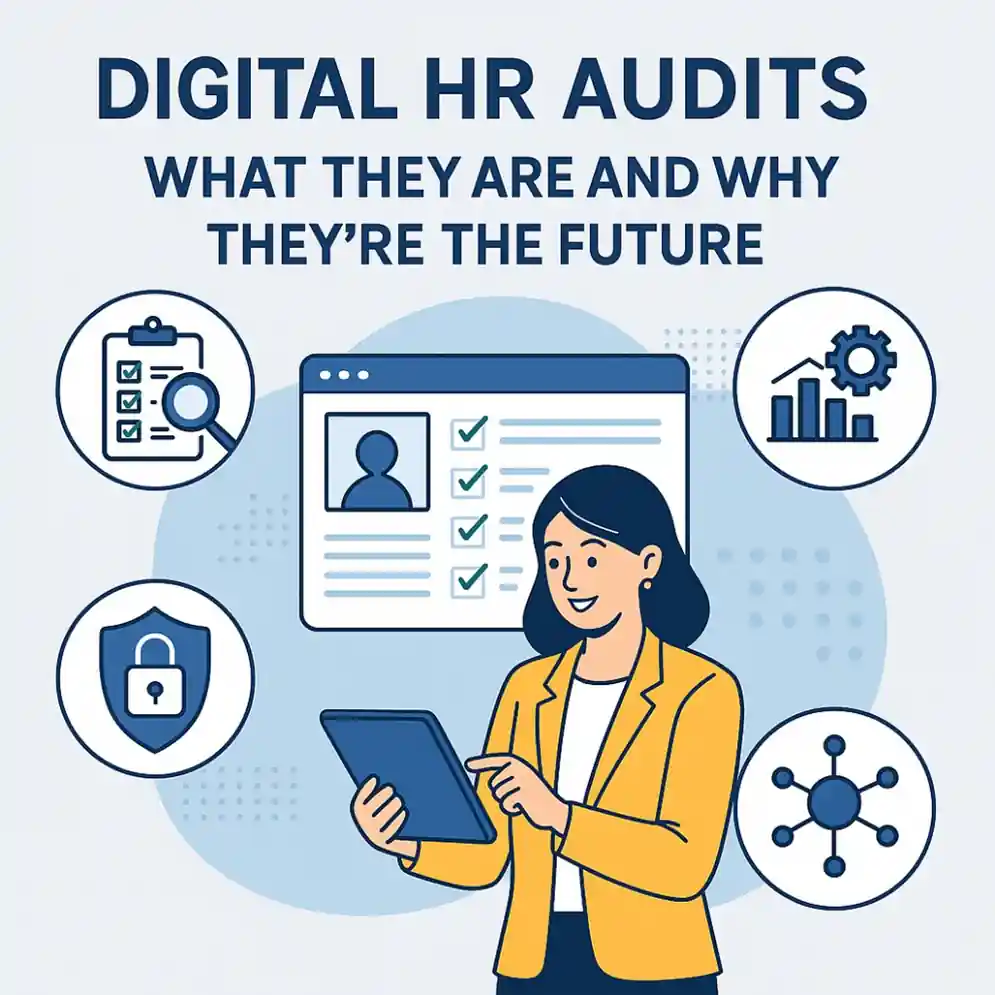
HR has evolved into a strategic function that impacts business expansion and workforce adaptability. It now plays a critical role in talent strategy, engagement, and culture building. HR is now seen as essential to a company's overall success, rather than just a support function. Digital tools are at the heart of this transformation, enabling HR professionals to improve their impact on the organization. With hybrid work and growing compliance demands, HR teams need real-time visibility. Digital audits provide the structure and insight to meet modern HR challenges. They allow HR leaders to quickly identify inefficiencies, reduce risks, and ensure compliance in an ever-changing regulatory landscape. As organizations grow, managing this complexity through traditional methods becomes unfeasible, making digital audits an essential tool for future-proofing HR operations.
Understanding the Core Concept: Using technology and analytics, a digital HR audit is a structured estimation of HR procedures. It helps organizations determine efficiency, and readiness for scale.
How It changes from Traditional Audits: Compare to traditional audits, digital audits are continuous, fast, and accurate They use smart tools to monitor data instead of relying on ancient spreadsheets.
Compliance and Documentation Review: Allows all policies and employee records are up to date and compliant with local labour laws. This helps avoid legal pitfalls and improves governance.
Workforce Metrics and Data Validation: Audits verify the accuracy of attendance, leave, and performance data. This results a single source of truth over HR systems.
Automating the Common: Regular checks and data collection are handled by instinct, saving time. It reduces dependence on manual inputs and improves consistency.
Leveraging Predictive Analytics: Analytics forecast trends in attrition, hiring, and performance. These insights allow HR to proactively address challenges.
Staying arranged with Labor Laws: Digital audits help HR stay current with complex labor regulations. Automated alerts ensure timely updates and reduce non-compliance risks.
GDPR and Data Privacy Adherence: Audit tools monitor how employee data is stored, accessed, and shared. This help businesses align with privacy laws like GDPR and India's PDP Bill.
Recruitment Pipeline Optimization: Audits highlight holdups and inabilities in the recruiting process. This supports better sourcing and faster onboarding.
Candidate Experience Insights: Digital tools capture feedback and drop-off data from applicants. HR can then improve the overall experience and brand perception.
Identifying Data Discrepancies: Digital audits flag inconsistent or outdated employee information. Correct data improves decision-making and employee trust.
Access Controls and Confidentiality: The system audits who has access to what data and when. This ensures sensitive information is protected at all times.
Salary Structure Correctness: Audits verify that salaries are consistent across levels and departments. This prevents inequity and supports equity.
Benefits Utilization Tracking: They help identify which benefits are underused or misunderstood. HR can adjust offerings to improve employee satisfaction.
Appraisal Equity: Digital audits check for rating inequities or irregularities in calculations. This ensures that performance reviews are fair and balanced.
Goal Alignment Review: They also ensure employee goals align with company objectives. This strengthens accountability and focus across teams.
Training Participation Rates: Audit tools calculate accomplishment rates and training outcomes. Low commitment signals the need for content or format changes.
Skill Gap Identification: They analyse if employees possess the right skills for current and future roles. HR can then customized learning strategies accordingly.
Engagement Pulse Surveys: Real-time feedback is collected through digital tools. These understandings tell latest trends and areas for upgrade.
Turnover Red Flags: Audits find out the common causes for resignation or withdrawal. Early detection helps to prevent avoidable issues.
HRIS and Cloud-Based Systems: A centralized HRIS provides all employee data is accessible and secure. Cloud systems support scalability and remote access.
AI and Visualization Dashboards: These tools convert complex data into actionable charts and alerts. HR can instantly see what needs attention.
Real-Time Insights: Managers get live access to HR metrics and reports. This supports quicker and fast data-driven decisions.
Improved HR Efficiency: Digital audits cut manual work, enabling leaner HR operations. This boosts both productivity and morale.
Resistance to Change: Some teams may sustain adopting new technologies. Communication and training are the key to help transitions.
Integration Challenges: Legacy systems may not integrate easily with new tools. Selecting the right HR partner ensures smoother implementation.
Assess Current Systems: Start by analysis existing HR workflows and pain points. This helps to define audit goals and system requirements.
Define Your Digital Roadmap: Plan a phased rollout with timelines, tools, and training. Insight HCM supports the clients to execute this transition with perfection.
Chennai Retailer Case Study: A Chennai-based retail firm reduced recruiting time by 40% through digital audits. They upgraded onboarding and candidate tracking considerably.
Insight HCM's Role: As a top HR consultancy in Chennai, Insight HCM provided the digital tools and strategic guidance needed for success.
Blockchain for Credentials: Future audits may use blockchain to verify educational and work histories. This will reduce cheat and accelerate recruiting.
ESG Integration in HR: Audits will soon cover diversity, inclusion, and sustainability metrics. This aligns HR with broader business ethics and goals.
Why Experience Matters: Skilled HR partners understand both compliance and culture. They assure audits are not just about data—but about people.
Tailored Audit Solutions: One-size doesn't fit all in HR. Insight HCM offers customized audit solutions based on industry and organizational maturity.


Digital HR audits are essential for businesses aiming to stay competitive in today’s fast-paced world. They provide real-time understandings into HR processes, assuring compliance and minimizing risks. By using digital audits, businesses can streamline operations, enhance efficiency, and enhance data accuracy. Partnering with an expert HR consultancy like Insight HCM assures a smooth transition and customized solutions tailored to your needs. Including digital transformation in HR is no longer optional but a strategic vital for long-term success. With Insight HCM’s skills, you can future-proof your HR operations and stay ahead in an ever-evolving business landscape.